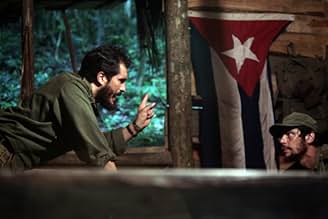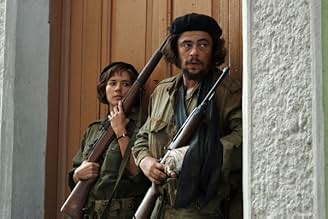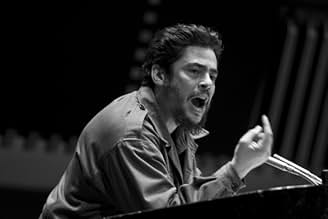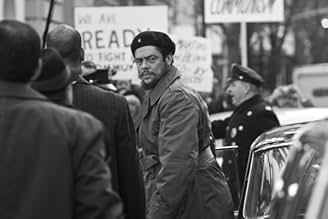En 1956, Ernesto 'Che' Guevara y un grupo de exiliados cubanos liderados por Castro movilizan un ejército para derrocar al régimen del dictador Fulgencio Batista.En 1956, Ernesto 'Che' Guevara y un grupo de exiliados cubanos liderados por Castro movilizan un ejército para derrocar al régimen del dictador Fulgencio Batista.En 1956, Ernesto 'Che' Guevara y un grupo de exiliados cubanos liderados por Castro movilizan un ejército para derrocar al régimen del dictador Fulgencio Batista.
- Dirección
- Guionistas
- Elenco
- Premios
- 4 premios ganados y 13 nominaciones en total
- Interpreter
- (as Óscar Isaac)
- María Antonia
- (as María Isabel Díaz)
- Fidel Castro
- (as Demian Bichir)
- Héctor
- (as Ramón Fernández)
- Alejandro Ramírez
- (as Yul Vázquez)
- Jorge Sotús
- (as Jsu García)
- Rebel Messenger #1
- (as Luis Rodríguez Sánchez)
- Juan Almeida
- (as Roberto Luis Santana)
- Dirección
- Guionistas
- Todo el elenco y el equipo
- Producción, taquilla y más en IMDbPro
Opiniones destacadas
I'll put this film together with Medem's 'La pelota vasca' (an assumed documentary) for they both show an extreme sensitivity working with such delicate themes as like they choose to work. Both originated some contesting, More with Medem's because the director was more rooted in the problem that was shown, and because the story is far from being closed, but to me they were both opened films which, as any contemporary film should be, leave a lot of the thinking to the public, and work as brain starter for discussion.
The narrative structure is effective, the artwork and editing are of great competence. Che in the woods of Sierra Maestra, on the verge taking the power in Cuba inter cut with his visit to the USA, in 1964. This second line is shot in black and white, the other has beautiful colors. The absence of music was a mildly risky choice i appreciated. The rest, you can think of it yourself. I thought Del Toro was very good, internally concentrated, resisted totally to being what we expected Che to be, and that's something, to be able to interpret a character with such an charismatic aura behind him, which we can still feel when his own words are spoken. From this film on, i admire Del Toro; before this i didn't look at him as i do now. I'll review his previews performances, i have to check if i didn't notice how good he is. Quite on the contrary, Bichir, as Fidel, was a total disaster, frankly one of the worst performances i've ever seen. How could he think Fidel was all about imitating a voice, some gestures, and handling a cigar. What a mess.
Of course this man's story is controversial, which means one can make radically opposed opinions out of the same known and accepted facts. The fair amount of arguments i've had since i saw it with someone who saw it with me prove me right here. I think Guevara was a lucid man, who read perfectly well the mechanics of the world of oppression where he stood. He chose to stand there and live like them, though he wasn't like them, and that's worth admiration. The ideas he made of the injustice he saw was a product of a genuine mind. But though the diagnosis was right, the whole process of making it in practical terms was a mess, to my eyes. He was at the root of a regime, inserted in a bigger regime, that grew on arrogance, on hypocrisies, and at a certain point became at least so unfair to the same oppressed people as those oppressed had before. And that's because, though wanting to do different, this revolution used the same weapons of strenght and physical superiority others had used. And that killed the whole idea. And Guevara was there, with it, being oppressive when he thought he was being better, out of, i think, ingenuity. What i say is, read the man, his observations are probably equally (or even more) correct today as they were when he made them, but don't follow his steps, i wouldn't, not knowing what i know today.
Also, notice how Che, the icon, grew to incredible proportions, 3 reasons i give it:
-He died young, and fighting for ideals, at least shooting for ideas;
-He was picked up by the very capitalism he rejected and was sold like an icon the population (mainly youth) desperate to get out of the contradictions in this regime, check the contradiction of this;
-He had an image standing for him, literally an image, the photograph Korda took. It's amazing, and it's probably an unique case, how a single image can move millions, how the right moment, with the right publicity can be so powerful. If you think about that, among the capitalists who sell tshirts and the liberals who believe Guevara, this is image is the center of the most successful publicity campaign ever. Once more, i admire Soderbergh's intelligence to leave that image out of this film. It's more than avoiding a cliché. It's avoiding the viewers to go recall clichés they've made (me included) over that image.
My opinion: 4/5
http://www.7eyes.wordpress.com
Of course, the icon that I refer to is quite obviously Cuban revolutionist Ernesto 'Che' Guevara here played by Benicio Del Toro, a figure now embellished upon the memories of those with slightest interest in political history. If not, then you probably have his face on a t-shirt somewhere and you didn't know. Yet it doesn't matter how or why you know of Guevara before you view Che because Peter Buchman does a fine job of introducing you to him here. Plus, coupled with a performance that never begs for attention but instead simply plays the man he's supposed to be portraying with no overt padding, Del Toro goes a long way to giving Che the right amount of conviction that is needed to keep thing interesting and dynamic. Make no mistake, this is no dramatization of the man's life, so Del Toro never piles on the melodrama or anything to that degree to win over the audience, and this is reflected not only through the movie's ensemble of performances, but through the entire production itself.
Had the feature remained its original singular, five hour form however, a different opinion may have been garnered, but as it stands, the movie does well on its own merit. Part One, which details the initial struggle of the revolution of Cuba, is less about Guevara and more about his cause under the leadership of Fidel Castro. Granted, focus is shifted every now and again to set up part two's inevitable centralization upon Che himself, but for the most part, Part One remains more as a wide-angled view on the movement in which Guevara was part of. This shift in focus does well to once again distance the movie away from mere speculative entertainment and more towards the form of an educational informant. Yes, there are scenes that drag on and on, and generally some of these seem superfluous and dubious to the overall arc of the production, but for the most part, the script and direction remains coherent in its willingness to merely document rather than emote.
As a whole, Che's first half is an unassuming picture. At first glance, it isn't anything remotely special, and probably won't provide viewers with any degree of resonance if they are not interested in the man and his people's struggle beforehand, yet the same can be said for a number of similar features. Instead, I can only recommend this to those who are interested in the revolution and don't mind slow paced, attention-demanding material that does entertain from time to time, but only as a natural result of its historical importance. Again, those looking for a character piece similar to Stone's portrayal of George W. Bush last year would be wise to reevaluate their will to see Che; although titled after the man himself, and a biopic on a purely ostensible level, Che is more about his fight than the man himself. There are no real moments of personal insight here, no cathartic revelations or studies of psyche. No, instead the movie tells the facts as they were, straight from the horses mouth, and while they can sometimes work against the common desires of cinema goers' need for personal fulfillment, if digested objectively, can provide a strongly engaging, interesting and informative piece of historically significant art.
- A review by Jamie Robert Ward (http://www.invocus.net)
Steven Soderbergh refrains, then, from counteracting the magnitude of Che: Part One's dense political platform by ramping up the fireworks. This wont appeal to mainstream viewers. This is not a Cuban Braveheart. This is not some twisted Scarface prequel. There will be no post-movie pop-art. Che: Part One is an intelligent and vital take on the man behind the myth not a balls-to-the-wall action spectacle blaring with blood, bullets and CGI. It's a thorough and naturalistic treatise on iconic human drive and endeavour that infrequently shuttles between monochrome and Technicolor, between Che Guevara's 1964 delegation at the UN headquarters and time spent trudging through the Cuban jungle.
If your understanding of certain political ideals and movements are, at best, hazy- then it's best to steer clear of this one. You're likely are likely to find the first serving of Soderbergh's four-and-a-half-hour, two part political epic a little confusing. This ain't no Hollywood funded, slick and stylish, over-dramatic chronicle concerned with entertainment or income. This isn't 'Defiance' or 'Valkrye'. This is a well-researched, claustrophobic and paced political drama (shot in Spanish) where spurts of action, violence and humour are few and far between. Imagine Oliver Stone's 'Salvador' by the way of Terrance Mallick's 'The Thin Red Line': fragmented, anti-mainstream and very heavy-going.
The bravura Benicio Del Toro stars as Che and is quite excellent. He delivers a focused and unwavering performance worthy of a thousand accolades: his finest since '21 Grams'. The fact that Del Toro is fluent in Spanish also helps, as does a rallying and unknown supporting cast that work well as a low-key ensemble. It's all about Del Toro, though. His insurgent, intense and convincing Che is one marred by crippling bouts of asthma yet defined by a burning desire to educate and reform- to put his litigious beliefs into action and unite Latin America.
With Che: Part One, the diligent Steven Soderbergh has found his blend of realism and narrative, documentary and drama. As an avid Che fan and reader of his books and biographies, there is little doubt in my mind that this monumental work will stand as the first piece in the definitive two part screen portrait of one the twentieth century's most iconic, yet largely uncharted, political figures.
Final Verdict: While lesser films wallow in the limelight, Che: Part One stirs understated in the shadows seemingly content with the fact that it wont appeal to all, or many. Steven Soderbergh has crafted a very loyal and well-made biopic. One that demythologises, one that educates, one that excels and ensues Walter Salle's soul-searching Che preface: The Motorcycle Diaries.
The acting of the cast all around was very good but Benicio Del Toro took the movie by storm but he did this in a very subtle way. His performance displayed how Che's spirit was able to superseded the hardships faced in the Cuban Revolution. It did not display any brutality or recklessness but a devotion to a cause. Del Toro's perforations was that worthy of an Oscar nomination but I don't think Che Guervara cared to much about awards.
The directing by Steven Soderbergh was visually stunning at times with much of the scenes shot in the forest. What kept the movie upbeat though were the scenes of Che in New York giving interviews and addressing the U.N. It added an extra layer to the film allowing you to see another side of Che. The side in which he shows his political and speaking abilities. The writing was very good with the dialog always keeping you engrossed. The music, though not much of it, was very good and stayed within rhythm of the rest of the film.
Overall the film succeeds in showing Che as a well rounded man never developing into oversimplified or unnecessarily complex portrayal of a man. The movie was very accurate and refused to take on a role of being inspiring or Hollywoodish which I enjoyed. The only problem with the film I had was that it seems to have a little too much of a feel of a war film rather than a biopic. Still I highly recommend this film.
Don't get me wrong, there is nothing specifically wrong with this film. It portrays a fairly accurate (if, as I said, sanitised) picture of the March on Santa Clara and the victory of Castro's rebels. However much in the same way as the kind of perpetually running museum film that you can dip in and out of it is largely uninspiring and leaves you feeling quite detached. The problem is not the direction or the acting which does manage to transport you into the heart of a Civil War ravaged Cuba. It is the fact that we learn next to nothing about Cuba, Che himself or the goals of the revolutionaries. We learn nothing of why the Batista regime was so bad that people wanted to overthrow it. Which means that this simply stands alone as a war film where there are lots of explosions, lots of running around and some scenes of people celebrating in the streets. While I understand from reports that Che Part Two is rather different I think that nevertheless the slight blandness of Che Part One means that, though it looks good, it does feel like a rather wasted opportunity.
¿Sabías que…?
- TriviaFor his role, Benicio Del Toro spent seven years researching Guevara's life.
- ErroresWhen the guerrilleros are in the Sierra Maestra, we can hear the coqui (Eleutherodactylus coqui) singing in the night. However, this small frog is endemic to Puerto Rico and the Virgin Islands, thus not possible to be heard in Cuba.
- Citas
Lisa Howard: What is the most important quality for a revolutionary to possess?
Ernesto Che Guevara: El amor.
Cuban Diplomat #1: [translating] Love.
Lisa Howard: Love?
Cuban Diplomat #1: Love of humanity... of justice and truth. A real revolutionary goes where he is needed.
- ConexionesFeatured in Así se hizo - Che El Argentino (2008)
- Bandas sonorasBasura
Written and Performed by Mark A. Mangini (as Mark Mangini)
Selecciones populares
Detalles
Taquilla
- Presupuesto
- USD 35,000,000 (estimado)
- Total en EE. UU. y Canadá
- USD 748,555
- Fin de semana de estreno en EE. UU. y Canadá
- USD 61,070
- 14 dic 2008
- Total a nivel mundial
- USD 34,209,066
- Tiempo de ejecución2 horas 14 minutos
- Color
- Mezcla de sonido
- Relación de aspecto
- 2.39 : 1





























